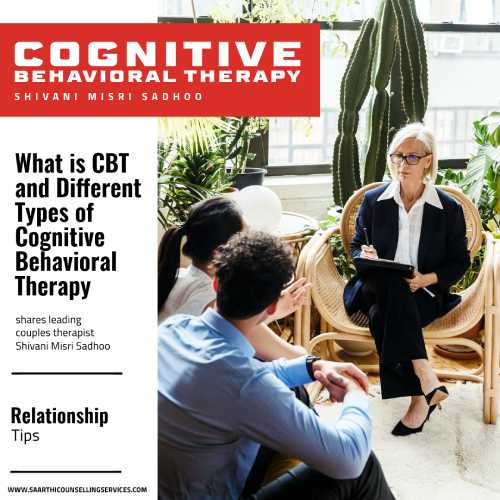In today’s fast-paced and competitive world, feelings of anxiety are not uncommon. In fact, experiencing anxiety can sometimes be beneficial, as it serves as a natural defence mechanism and can even enhance performance in stressful situations. Whether it’s the anticipation before an important exam or a high-stakes sports event, a rush of anxiety can sharpen focus and increase motivation.
However, for some people, anxiety reaches a level where it significantly impairs functioning, so it’s essential to seek effective coping strategies. This is where Cognitive Behavioral Therapy (CBT) comes in. India’s leading cognitive behavioral therapist, Shivani Misri Sadhoo introduces us to CBT and its types in this article.
What is Cognitive Behavioral Therapy?
CBT is a type of talking therapy that focuses on identifying and challenging unhelpful thoughts and behaviors. It operates on the premise that our thoughts, feelings, and behaviors are interconnected, and by changing negative thought patterns, one can alleviate emotional distress and improve overall well-being. Essentially, CBT aims to replace maladaptive coping mechanisms with healthier ones, ultimately leading to a more balanced and fulfilling life.
Tracing its Origin
Behavioural treatment emerged in the early 1900s, championed by Skinner, Pavlov, and Watson. The first wave in the 1930s/40s addressed the emotional impacts faced by the many WWII veterans returning from war. Albert Ellis, an American psychologist, played a significant role in developing cognitive therapy as an offshoot of behaviourism.
In the 1950s and 1960s, psychiatrist Aaron T. Beck observed patterns in his depressed clients, leading him to recognize the connection between thoughts and emotions. He coined the term “automatic thoughts” to describe the thoughts that surface in people’s minds, even if they aren’t always aware of them.
What are the Types of CBT?
Rational Emotive Behavior Therapy (REBT) was developed by Albert Ellis, an American psychologist in the 1950s and is one of the earliest forms of cognitive psychotherapy. It focuses on how our thoughts affect our feelings and behaviors. Instead of blaming events for our emotions, REBT suggests that it’s our thoughts about those events that cause distress. The therapy helps people recognize and challenge their irrational beliefs, replacing them with more rational ones. REBT has been found effective in treating depression, social anxiety, anger issues, and disruptive behavior. It’s usually brief, with results often seen in as few as five sessions or within a few weeks to months.

Dialectical Behavior Therapy (DBT) was created by Dr. Marsha Linehan and is a form of therapy that builds on Cognitive Behavioral Therapy (CBT). ‘Dialectical’ means considering two opposite theories or ideas. This therapy emphasizes accepting uncomfortable thoughts, feelings, and behaviors rather than fighting against them. By accepting these discomforts, DBT promotes change through mindfulness and being present in the moment.
Originally developed for Borderline Personality Disorder (BPD), DBT is now widely used for various mental health issues. It helps individuals who frequently experience intense, unpredictable, negative emotions. DBT encourages accepting oneself while also working to change unhelpful behaviors. This might sound contradictory, but DBT helps achieve both goals simultaneously. It’s effective for treating conditions like BPD, bipolar disorder, self-harm, and eating disorders. A full DBT program typically lasts six months to a year.
Cognitive therapy (CT) is one of the oldest forms of cognitive behavioral therapy (CBT) and was initially designed to help with depression. It works on the idea that our thoughts affect how we feel. By changing negative or distorted thoughts, people can improve their mood, behavior, and overall well-being. Typically, patients see positive results after attending eight to 16 sessions of CT. This therapy involves teamwork, with both therapist and patient setting agendas and assigning tasks for between sessions. The focus is on correcting unhelpful thoughts and behaviors.
Acceptance and Commitment Therapy (ACT) helps manage inner experiences like emotions and thoughts. It encourages facing difficult feelings instead of avoiding them. By understanding values, you align actions with what’s important, promoting a meaningful life. ACT teaches acceptance of normal reactions to situations, leading to positive behavior changes. It’s beneficial for depression, anxiety, stress, addiction, and chronic pain.
Now that we’ve explored various forms of Cognitive Behavioral Therapy (CBT), including REBT, DBT, CT, and ACT, it’s evident that they all aim to empower individuals to challenge negative thoughts and behaviors, fostering emotional well-being and a more fulfilling life.

Shivani Misri Sadhoo is an internationally recommended relationship Counsellor by world’s biggest and most trusted study and research-based foundation for couples therapy – Gottman Institute. She is trained on specialised key relationship counselling Skills from AIIMS, VIMHANS and various other reputed institutions. Counselor Shivani Misri Sadhoo, is also Certified for Emotionally Focused Therapy, Cognitive Behavioral Therapy and Dialectical Behaviour Therapy.
Counsellor Shivani Misri Sadhoo is also a Certified Neuro Linguistic Practitioner with specialised training and experience in the field of affairs/betrayals, trust issues, difficulty communicating, conflicting values, bereavement, grief and loss (affairs, separation, divorce, childhood) and emotional health issue (anxiety, social anxiety, fear, depression, low mood).
Currently, Shivani Misri Sadhoo is one of the top counsellors with the HIGHEST Success Rate with over 17,000 happy couples and individuals (based in India and abroad), who has benefited from her therapy. Psychologist and Counselor Shivani Misri Sadhoo not only practice independently from her clinic in Greater Kailash, Delhi, India but also listed on the panel of eminent hospitals like IBS Hospital – Institute of Brain & Spine, Express Clinic, Fortis (formerly) based in Delhi.



